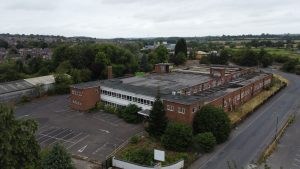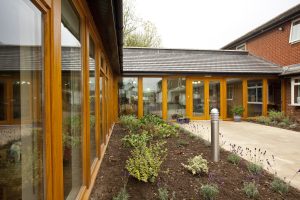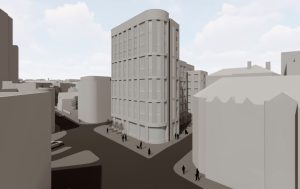The lost decade – how Broad Marsh mistakes set Nottingham back
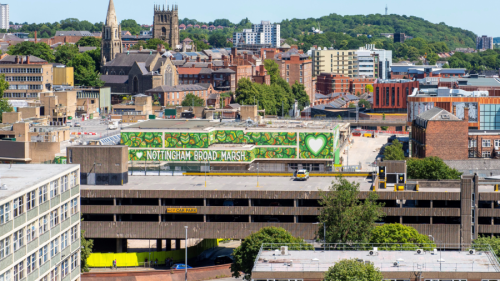
The sale of the Broad Marsh site in central Nottingham to Homes England brings a major leap forward in what has seemed like a never-ending saga.
The bones of the former shopping centre stand testament to years of stalled plans, mismanagement and the shift away from malls and to online retail.
In the middle of this confusion came Covid and the collapse of shopping centre operator Intu.
But, let’s take this tale back to 2018, when Intu was flaunting its plans for an £81m redevelopment of its Broadmarsh
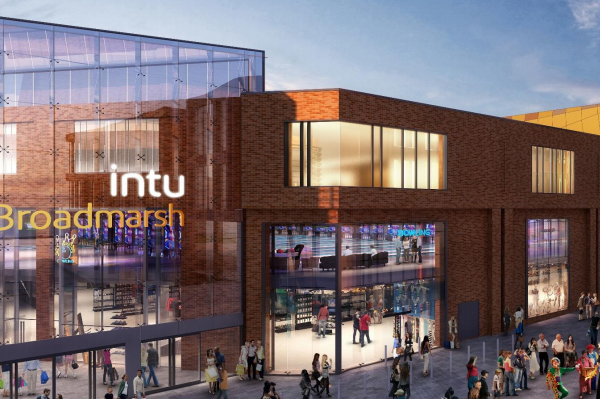
How Intu’s new Broadmarsh would’ve looked
shopping centre. The company claimed back then that the redeveloped centre was already a third pre-let and would propel Nottingham up from its then position of 12th in the UK retail rankings to sixth. It had already lined up Hollywood Bowl and The Light cinema an anchor tenants.
In July of that year, intu’s development director Martin Breeden told TheBusinessDesk.com he was ‘”excited” about the new scheme.
“The transformation of intu Broadmarsh is underway and we’re really excited about what’s to come,” he said. “We plan to bring a new mix of places to shop, eat, relax and play for our customers to enjoy, including The Light Cinemas and Hollywood Bowl, two big names that have signed up to the new centre.”
At the time, intu said that 50% of the new centre was now either pre-let “or in advanced negotiations”.
In August, we learned that intu had spent the summer targeting the likes of Boden, Mango and The White Company and had been in discussions with The Ivy, Cath Kidston and Seasalt.
But then, everything changed.
In November 2018 a £2.9bn deal which would’ve create the UK’s largest property firm collapsed after a buying consortium pulled out citing “market volatility”.
Intu, which also owned the Victoria Centre in Nottingham and a share of what is now the Derbion in Derby, had been locked in talks with a consortium led by Manchester based Peel Properties.
But, according to London Stock Exchange rules, the deal ran out of time and dramatically collapsed.
Intu’s shared nosedived and the already permanently-stalled regeneration of the Broadmarsh shopping centre was in grave doubt.
Given what has happened since, it seems remarkable that just before Christmas 2018, Nottingham City Council agreed a £50m funding plan so that the redevelopment of the Broadmarsh shopping centre could start.
Buoyed by this, Intu entered 2019 by announcing Sir Robert McAlpine as the main contractor on its planned Broadmarsh revamp.
Announcing the news, Breeden said: “The Light and Hollywood Bowl are both committed to the centre and there is significant interest from a number of retailers and restaurants in taking space at the centre. We are creating the most exciting development in the city’s southern area for more than five decades and we continue to work with Nottingham City Council on their plans for the wider Broadmarsh area, which is a fabulous regeneration programme.”
By May 2019, work had actually begun on the scheme, and Intu was claiming that that it now had occupiers or was in advanced negotiations for 70% of the units in the mall once its regeneration was completed.
In the days before the UK was plunged into lockdown, Intu posted huge losses of over £2bn. The market value of Intu’s investment and development property portfolio had declined from just under £9.2bn to £6.6bn.
Intu spent the time the UK was in the early days of lockdown appointing a restructuring boss and scrambling for standstill agreements with its financial stakeholders.
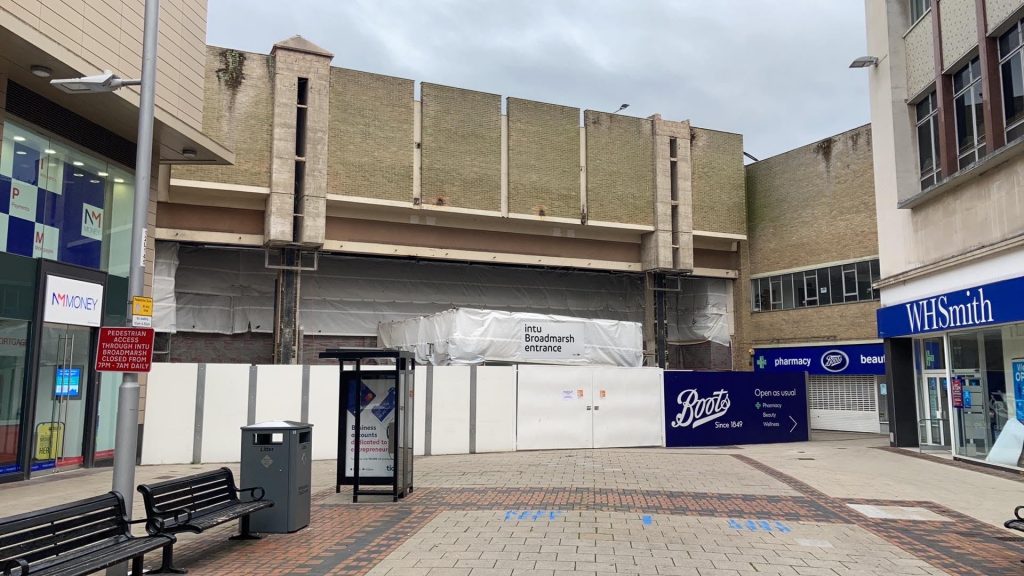
An empty Broadmarsh shopping centre
As other construction sites stayed open during lockdown, Intu’s work on the Broadmarsh had stayed closed since March 2020. In June, it announced that the centre was now completely shut due to safety concerns.
Late June saw a report from Nottingham City Council revealing it had spent £17m on the plans to redevelop the intu Broadmarsh, in which it has a stake. The news came the day after Intu called in administrators from KPMG.
In July, Nottingham City Council took back control of the Broadmarsh shopping centre, in which it had maintained a stake in.
The “Broadmarsh Big Conversation” was first mooted in October 2020, citing a panel “nationally-renowned experts” who would try and find a way for what was now a major albatross for Nottingham city centre – and the council.
By December, outline plans to replace the “bleak” Broadmarsh centre with a “post-Covid wildscape” had been revealed. This was later to become the now-launched “Green Heart” area.
Come March 2021, some £12m had been secured to begin work on demolishing the grey hulk of the former mall.
Then, in April 2021 Peveril Securities and Sladen Estates revealed plans for New Albion Place, located next to the former Broadmarsh shopping centre site.
The plans include the redevelopment of two acres of land surrounded by Canal Street, Collin Street and Greyfriar Gate.
However, the city council wasn’t keen on the plans, saying that the proposed scheme is on land it partly owns and land partly-owned by the developer, and that the scheme has been proposed “unilaterally” by Sladen and Peveril.
There was a major setback for the city council in October 2021 when the £20m it asked for from the then-Government’s Levelling Up Fund to set up the Broadmarsh site for redevelopment was turned down.
Heatherwick Studio, which was commissioned by the Greater Broad Marsh Advisory Group, unveiled a vision to create 6,000 jobs, over 400,000 sq ft of commercial and business space and 750 homes on the site in December 2021. It was immediately dubbed as “neverland” by former Nottingham City Council leader Jon Collins.
Devolution finally helped the city council get the funding it needed to knock down the remainder of the former shopping centre – and now the sale, which was promised in March, has been revealed.
The story is not yet over, of course. The council has said that any development work will start in 2029-30. By then, the derelict site will have acted like an weight around Nottingham’s neck for a decade. This time, it really can’t afford to fail.

